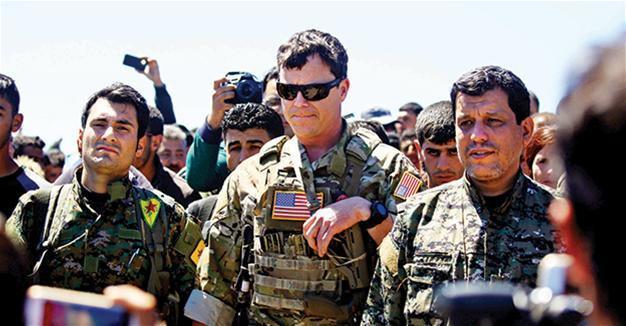US plans to press Raqqa button after Erdoğan-Trump summit
Cansu Çamlıbel - WASHINGTON

AFP photo
The United States is mulling over starting the much-anticipated Raqqa operation to defeat the Islamic State of Iraq and the Levant (ISIL) immediately after President Recep Tayyip Erdoğan’s first in-person meeting with President Donald Trump in mid-May, amid reports that the White House may give a green light for providing weapons to the Syrian Kurds in a more direct way.Ahead of the Erdoğan-Trump meeting on May 16, officials covering Turkey in various state institutions in Washington have intensified their work on messages to be delivered to the Turkish government during the talks.
Erdoğan’s spokesperson İbrahim Kalın, who is expected to be appointed as a minister in a cabinet reshuffle at the end of this month.
The Turkish president has suggested that the top issue on the agenda will be the U.S.’s alliance with the Syrian Democratic Union Party (PYD) and its armed wing, the People’s Protection Unit (YPG) in the fight against ISIL, particularly ahead of the Raqqa operation. Turkey considers the PYD/YPG to be an affiliate of the outlawed Kurdistan Workers’ Party (PKK) in Syria and has long been pressing the U.S. to cease its cooperation with the group.
Pentagon’s plans unchanged
However, despite the presence of U.S. Secretary of Defense James Mattis, who has been appreciated by Ankara for his acknowledgement on Turkey’s sensitivities over the PKK, the Pentagon has not changed its original plans for the liberation of Raqqa from the jihadists.
One recent indication of this was the patrolling of U.S. troops along with PYD/YPG forces in northern Syria after the Turkish military’s operation that hit the Syrian Kurdish force’s command center in Karaçok province and other targets.
President Erdoğan strongly reacted against the U.S. patrolling with the YPG in the northern Syria and said he will make it an issue during his meeting with Trump later this month. However, there are also suggestions that Trump will sign an executive order paving the way for providing arms to the YPG in a direct way.
Raqqa after Erdoğan
The timing of the big Raqqa operation is apparently to be set in line with the Erdoğan-Trump meeting in Washington. The Trump administration had preferred to launch the offensive on Raqqa after the accomplishment of the referendum process in Turkey in order not to make such an important anti-terror fight a domestic political issue in an allied country.
Now the expectation is to issue the presidential order for Raqqa after Erdoğan’s meetings in Washington as preparations in the field have visibly intensified in recent weeks.
Positive agenda sought
As there is little chance of reaching a consensus over the YPG’s role in the anti-ISIL fight, the State Department has been trying to find ways to balance U.S. policies toward Turkey by submitting a positive agenda during Erdoğan’s visit. However, diplomatic sources say Ankara’s recent military attacks on the YPG have put State Department officials in difficulty on these efforts.
Reliable sources say State Department officials introduced a set of proposals to Secretary of State Rex Tillerson that would ease relations with Ankara. One of the proposals submitted to Tillerson over Raqqa includes halting the operation, putting in place a long-term plan for the liberation of Raqqa in a lengthier siege rather than launching a massive operation with the YPG.
The other proposal includes the U.S. leading a restructuring of the Syrian Democratic Forces (SDF), a large coalition of forces whose command is in the YPG, after completion of the Raqqa operation. The SDF could thus be cleared of YPG elements and its command could be given to Arab forces, with Syrian Kurds returning to Rojava.
Other possible proposals include the U.S. launching dialogue for the establishment a new structure in which all Syrian Kurds and other ethnic groups are equally represented. A regional autonomous region for the Syrian Kurds similar to the Iraqi Kurdistan Regional Government (KRG) could be considered in the long-term, but on the condition that the PKK’s ideological dominance is first broken.
















